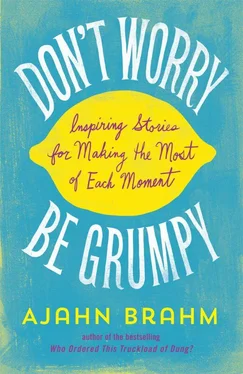One day in Kathmandu, a couple of Americans told me that there was a vehicle carrying the mail going north to the border with Tibet and it took travelers along for a few rupees. It was an attractive outing, so early the next morning, I was on the mail van going north.
Around 1:00, the driver of the van stopped for lunch in a little mountain village. The two Americans suggested we climb a small hill close by while our driver had his meal. Fifteen minutes later, when we reached the top of the hill, the clouds to the north parted. For the first time, I could see the vast range of the Himalaya in the rain-cleansed air. The view was more breathtaking than the climb up that hill.
Wanting to take a picture, I realized I had left my camera in the mail van, so I quickly ran down the hill, gathered the camera, and scampered up the hill as fast as I could. Just as I reached the summit, the clouds closed. I had missed out by only a few seconds. As it would turn out, I wouldn’t see the mountains again. The Americans, who had simply sat enjoying the inspiring view, turned to me to ask where I had gone. Even worse, they then described to me in awestruck detail the amazing view and wonder that I had lost.
I felt such a dummy. Fetching my camera had cost me the extraordinary view. But I learned that when you try to capture a moment, with a photograph or by noting it down, it often escapes from you, and you miss all the wonder.
Like the glorious Himalaya, our life’s magic moments are for experiencing and not for imprisoning in a camera. They are unforgettable anyway, so why do we need to photograph them?
In the ancient world, a single wise teacher would teach a group of students everything they needed to know about life. One such teacher had a dozen students who were close to graduation. He also had a daughter who all his students thought was hot.
One day he announced to his students that he had two problems. The first was that he had to find a husband for his daughter, and according to the tradition of those days, it should be one of his twelve students. The difficulty was that he couldn’t decide which student would make the best husband.
The second problem was that he, as the father of the bride, would have to pay for a lavish wedding ceremony and also set up the couple in a new house with all the necessities. The difficulty was that this was a great expense.
To solve both these problems, the teacher announced a contest. He asked his students to creep stealthily into the local village under the cover of night and steal whatever they could, as long as no one saw them. Then they would bring all the goods back to the teacher. Whichever student followed the instructions and stole the most would win his daughter, and all the stolen valuables would go to the happy couple.
The students were shocked that their teacher was asking them to steal. He was usually such a moral man. In those days, though, so important was the vow of obedience to one’s teacher that they accepted the contest. Or perhaps it was that all the young men were blinded by desire for their teacher’s gorgeous daughter?
Over the next seven days, the cunning students snuck into the village late at night, stole whatever they could, and brought it back to their teacher. The teacher kept a careful record of which student stole what and from which house. Amazingly, no student got caught in the act.
At the end of the week, the teacher assembled the students to announce the result.
“You have stolen so much,” began the teacher, “enough for any couple to get a good start in life. Except for one of you, who has not brought back anything at all. Why not?”
The shy young student came forward and said, “Because I had to follow your instructions, sir.”
“What do you mean? Did I not instruct you to steal and bring the goods back to me?”
“Yes, sir,” said the student, with downcast eyes, “but you also instructed us to steal as long as no one sees you . I crept into many houses at 2:00 in the morning, when everyone was fast asleep. But every time I was about to steal something, I noticed someone was watching me. So I had to leave empty-handed, sir.”
“If everyone in the house was sleeping, then who was watching you?” asked the teacher.
“I was watching me, sir. I could see myself about to steal. That is why I took nothing.”
“Very good! Very good!” exclaimed the delighted teacher. “At least I have one wise student who has been listening to me all these years. All the rest of you nincompoops, take all the stolen goods back to their owners. They won’t punish you. I told them about this ‘contest’ two weeks ago. They were expecting you. That is why none of you were caught. And remember, whatever immoral act you do, someone will always see you, and that someone is yourself. Because you see it, you will feel bad and suffer.”
Of course, the wise student married the beautiful daughter. The teacher was wealthy enough to give them an opulent wedding ceremony and a well-furnished dream house. Then, because the husband was truly wise, they actually did live happily ever after.
How Another Student Learned to Laugh at Abuse
The former story was from ancient India. The following story is from ancient Greece, where the method of education was very similar. A single teacher would teach his students everything.
One particular teacher was bad tempered and would often scold a student for making the slightest mistake. Having verbally abused the young man, the teacher would then charge him for the privilege of being admonished. It was regarded as an extra tutorial, worthy of a fee to the teacher.
One such student went to work in Athens after graduating. Whenever his boss or anyone else verbally abused him, the student would laugh merrily.
In those days, one of the worst curses, coming from the nearby Middle East, was: “May the fleas from a thousand camels infest your armpits!”
He even laughed at that. He did not get upset at any insult. His friends and colleagues thought he was a few pillars short of a Greek temple, but in all other matters he appeared sane. So they asked him why he always laughed when he was rebuked.
“When I was a student,” he replied, “I had to pay for being criticized. Now I get it for free. That is what makes me so happy.”
Perhaps we should charge our children every time we have to shout at them for not cleaning their room or for not doing their homework. Then, later on in their lives, when their partner scolds them or a boss shouts at them, they will never get angry and only laugh merrily, like that student of ancient Greece.
Learning from the Experts
My Christian friends at Cambridge told me that they were about to do some volunteer work at the local hospital for those with mental disabilities. As a Buddhist, I thought that I should volunteer too — to “keep up with the Joneses” as they say. So my reason for going was nothing more than religious pride.
Every Thursday afternoon, we would catch the bus from Cambridge to Fulbourn Hospital to help in the occupational therapy department for those institutionalized with Down’s syndrome. My Christian friends stopped going after a few weeks, but I carried on for two years. Even though my studies in theoretical physics took up most of my spare time (after my busy social life, which took priority of course), I never missed the chance to go to visit my friends with Down’s syndrome. I truly enjoyed every Thursday afternoon.
What surprised me was how emotionally intelligent they were. If I arrived tired after last night’s party, or depressed after breaking up with a girlfriend, they would pick it up straight away. They would give me a hug and a sincere smile that would melt me. Their hearts were open and uncomplicated, not like mine!
Читать дальше










